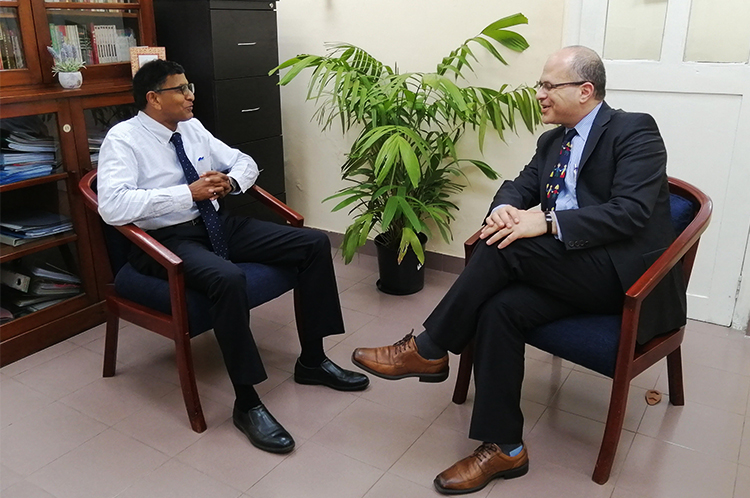February 13, 2020 Reading Time: 4 minutes

Reading Time: 4 min read
The Executive Director of the Lakshman Kadirgamar Institute of International Relations and Strategic Studies (LKI), Dr Ganeshan Wignaraja interviewed the U.S. Deputy Assistant Secretary of State for South and Central Asian Affairs, Mr. Jonathan Henick on the Indo-Pacific Strategy and policy implications for South Asia.
This interview is part of the LKI Spotlight series, which feature interviews with thought leaders, diplomats and professionals from around the world on current and emerging issues concerning international relations.
Mr. Jonathan Henick is a senior member of Foreign Service of the United States of America and currently serves as the Deputy Assistant Secretary for Central Asia Affairs, Public Diplomacy and Press. He previously served as Acting Deputy Coordinator of the Global Engagement Centre (GEC) where he helped to lead and coordinate all U.S. government efforts to counter disinformation from Russia, China, and Iran. Prior to that he was the Principal Deputy Coordinator and Acting Coordinator for the Bureau for International Information Programs. He has also served as the Acting Deputy Assistant Secretary and Director for Press and Public Diplomacy in the Bureau for South and Central Asian Affairs where he was responsible for the conduct of U.S. public diplomacy in 13 countries, including Afghanistan, Pakistan, and India.
See below for a lightly edited transcript of the interview, featuring Deputy Assistant Secretary of State, Mr. Jonathan Henick’s remarks to questions posed by Dr Ganeshan Wignaraja, Executive Director of LKI.
LKI: What is novel about the new Indo-Pacific Strategy and how does it differ from former President Obama’s Pivot to Asia policy?
Mr. Henick: The Indo Pacific Strategy as announced by President Trump in 2017 is a clear reaffirmation of the United States’ enduring commitment to the Indo-Pacific. In a sense, it represents more a community than change and it certainly represents the US belief that the success of the Indo-Pacific has been built on a number of enduring principles, including transparency, accountability, and good governance. These are all equally critical to the private sector growth that has led to economic development in many countries in the region and also the key to future economic development.
LKI: Can you elaborate on the idea of India being a net security provider for South Asia?
Mr. Henick: In the last several decades we have seen a number of momentous changes in the region and certainly India has emerged as a very important regional, if not global, player. We have a strong partnership with India and also partnerships with other countries in the region such as the Quad arrangement, which includes Japan and Australia. We are building very strong partnerships with countries like Sri Lanka and Bangladesh. The ‘Indo’ in the Indo-Pacific strategy obviously refers to the Indian Ocean. I think it’s fair to say that we hope India will continue to play an important role in the region and beyond in partnership with the United States and consistent with the principles I underlined before. In terms of the net security contour, one of the three pillars of the Indo-Pacific strategy is the security pillar. By that I mean not any kind of alliance, but simply a regional aspiration that we will continue to have freedom of navigation in the region, expand maritime security, and expand cooperation to counter trafficking narcotics, trafficking of persons, and terrorist threats. Those are all things we believe are worth investing in our joint efforts. We hope that India will work together with us on regional issues.
LKI: Sceptics say that the Indo-Pacific is a strategy to contain China. What is your view on this?
Mr. Henick: The Indo-Pacific strategy is not intended to exclude any country and in fact it encourages China to play a role in the region that is consistent with international standards that we believe most countries in the region would like to uphold. We recognise full well that China will be a major source of investment and a much-needed source of investment for many of the countries in the region. We only hope that investments will be done in a transparent manner according to international standards and done in a way that is consistent not only with China’s commercial interest but also the best interest of countries benefiting from that.
LKI: How do you see Sri Lanka in the context of the Indo-Pacific strategy?
Mr. Henick: We have been a partner with Sri Lanka for over a half century and we believe that partnerships are based on shared values. Sri Lanka is Asia’s oldest democracy and, in that sense, we look to Sri Lanka as an important partner in going forward as we jointly work to build a prosperous Indo-Pacific. Sri Lanka is a sovereign country and we respect Sri Lanka’s sovereignty. We are having good conversations with Sri Lanka’s new government about central areas for collaborations and deepening our partnership. There are plenty of opportunities for us to work together.
LKI: What are the economic and development dynamics of the Indo-Pacific strategy?
Mr. Henick: Apart from the security dimension, the two other pillars of the strategy are the economic pillar and the governance pillar. Both of these are defined really to address the principle obstacles and challenges that may be preventing foreign investors from investing in the region. We have number of programmes under each of those pillars that are looking at issues like energy, cybersecurity and providing technical assistance to countries that are looking to attract infrastructure investments. We are working with governments in the region to put in place the kind of transparency that foreign investors are looking for and provide them the security and the stability they are looking for before making investments. We recognise that unlike some other countries we cannot dictate to US companies when and where they should invest. What we can do is try and work with the countries in the region to improve the business environment and to make their countries more attractive to US investment.
END